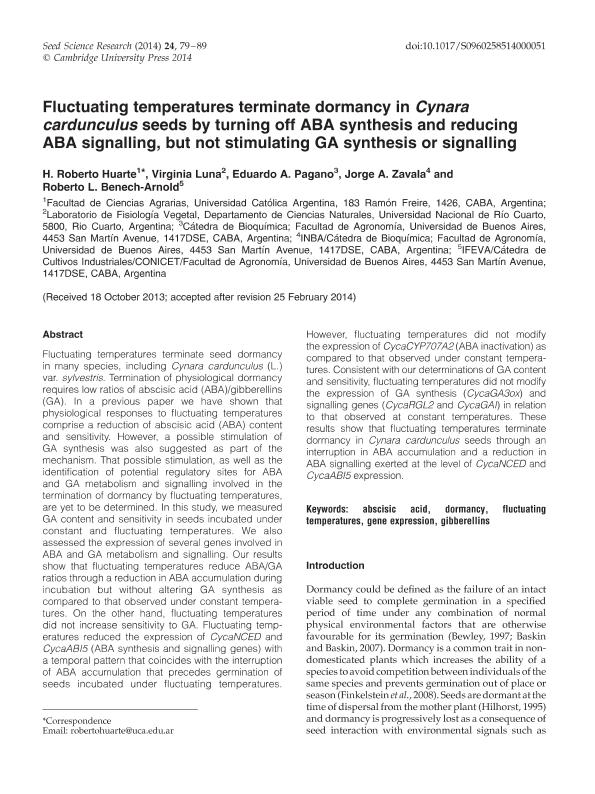Artículo
Fluctuating temperatures terminate dormancy in Cynara cardunculus seeds by turning off ABA synthesis and reducing ABA signalling, but not stimulating GA synthesis or signalling
Huarte, H. Roberto; Luna, Maria Virginia ; Pagano, Eduardo A.; Zavala, Jorge Alberto
; Pagano, Eduardo A.; Zavala, Jorge Alberto ; Benech-Arnold, Roberto Luis
; Benech-Arnold, Roberto Luis
 ; Pagano, Eduardo A.; Zavala, Jorge Alberto
; Pagano, Eduardo A.; Zavala, Jorge Alberto ; Benech-Arnold, Roberto Luis
; Benech-Arnold, Roberto Luis
Fecha de publicación:
04/2014
Editorial:
Cambridge University Press
Revista:
Seed Science Research
ISSN:
0960-2585
Idioma:
Inglés
Tipo de recurso:
Artículo publicado
Clasificación temática:
Resumen
Fluctuating temperatures terminate seed dormancy in many species, including Cynara cardunculus (L.) var. sylvestris. Termination of physiological dormancy requires low ratios of abscisic acid (ABA)/gibberellins (GA). In a previous paper we have shown that physiological responses to fluctuating temperatures comprise a reduction of abscisic acid (ABA) content and sensitivity. However, a possible stimulation of GA synthesis was also suggested as part of the mechanism. That possible stimulation, as well as the identification of potential regulatory sites for ABA and GA metabolism and signalling involved in the termination of dormancy by fluctuating temperatures, are yet to be determined. In this study, we measured GA content and sensitivity in seeds incubated under constant and fluctuating temperatures. We also assessed the expression of several genes involved in ABA and GA metabolism and signalling. Our results show that fluctuating temperatures reduce ABA/GA ratios through a reduction in ABA accumulation during incubation but without altering GA synthesis as compared to that observed under constant temperatures. On the other hand, fluctuating temperatures did not increase sensitivity to GA. Fluctuating temperatures reduced the expression of CycaNCED and CycaABI5 (ABA synthesis and signalling genes) with a temporal pattern that coincides with the interruption of ABA accumulation that precedes germination of seeds incubated under fluctuating temperatures. However, fluctuating temperatures did not modify the expression of CycaCYP707A2 (ABA inactivation) as compared to that observed under constant temperatures. Consistent with our determinations of GA content and sensitivity, fluctuating temperatures did not modify the expression of GA synthesis (CycaGA3ox) and signalling genes (CycaRGL2 and CycaGAI) in relation to that observed at constant temperatures. These results show that fluctuating temperatures terminate dormancy in Cynara cardunculus seeds through an interruption in ABA accumulation and a reduction in ABA signalling exerted at the level of CycaNCED and CycaABI5 expression.
Archivos asociados
Licencia
Identificadores
URL:
http://goo.gl/4Z9R0h
Colecciones
Articulos(CCT - CORDOBA)
Articulos de CTRO.CIENTIFICO TECNOL.CONICET - CORDOBA
Articulos de CTRO.CIENTIFICO TECNOL.CONICET - CORDOBA
Articulos(IFEVA)
Articulos de INST.D/INV.FISIOLOGICAS Y ECO.VINCULADAS A L/AGRIC
Articulos de INST.D/INV.FISIOLOGICAS Y ECO.VINCULADAS A L/AGRIC
Articulos(INBA)
Articulos de INST.DE INVEST. EN BIOCIENCIAS AGRICOLAS Y AMBIENTALES
Articulos de INST.DE INVEST. EN BIOCIENCIAS AGRICOLAS Y AMBIENTALES
Citación
Huarte, H. Roberto; Luna, Maria Virginia; Pagano, Eduardo A.; Zavala, Jorge Alberto; Benech-Arnold, Roberto Luis; Fluctuating temperatures terminate dormancy in Cynara cardunculus seeds by turning off ABA synthesis and reducing ABA signalling, but not stimulating GA synthesis or signalling; Cambridge University Press; Seed Science Research; 24; 2; 4-2014; 79-89
Compartir
Altmétricas



